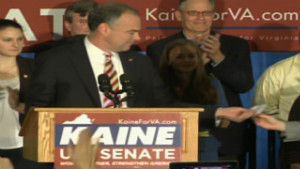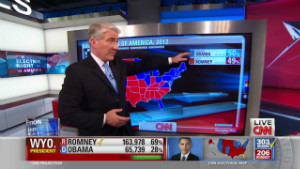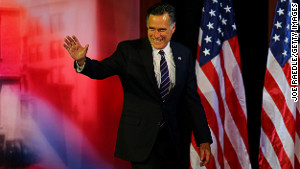 Washington (CNN) -- President Barack Obama rode a wave of broad support from moderates, women and minorities to win re-election Tuesday by defeating Republican challenger Mitt Romney in Democratic strongholds and key battleground states.
Washington (CNN) -- President Barack Obama rode a wave of broad support from moderates, women and minorities to win re-election Tuesday by defeating Republican challenger Mitt Romney in Democratic strongholds and key battleground states.
According to CNN projections, Obama surpassed the decisive 270-vote threshold in the Electoral College with victory in Ohio. That and a later projected victory in another swing state -- Virginia -- gave him 303 electoral votes to 206 for Romney, according to the CNN call based on unofficial returns.
Joyful supporters danced and cheered at Obama's victory party in Chicago, and the president thanked them for ensuring the nation will continue to move forward while warning the battle for change they seek will continue to be difficult.
"Tonight, in this election, you, the American people, reminded us that while our road has been hard, while our journey has been long, we have picked ourselves up, we have fought our way back, and we know in our hearts that for the United States of America, the best is yet to come," Obama said to prolonged cheers.
He emphasized his main campaign theme of fighting for equal opportunity for all, saying the political arguments that come with democracy in America were a necessary part of the process.



"We will disagree, sometimes fiercely," Obama said, noting that "progress will come in fits and starts" and the victory Tuesday night "won't end all the gridlock."
Foreshadowing hard decisions ahead, the president said blind optimism and wishful idealism "can't substitute for the need to make difficult compromises to move forward."
When he finished, the first family and Vice President Joe Biden and his family joined him onstage in a celebration of waves, hugs amid a blizzard of confetti.
In Boston, Romney supporters hugged and wept in a somber vigil while waiting for their candidate to concede.
In a brief speech he delivered alone, Romney congratulated and said his prayers would be with the president at such a challenging time for the country.
"At a time like this we can't risk partisan bickering and political posturing," Romney said, later adding that he wished he had "fulfilled your wishes to lead this great country in a different direction."
Romney's wife, Ann, and most of his family, as well as running mate Rep. Paul Ryan and his family then came on the stage for a few minutes in what was a subdued farewell.
Late push by Romney falls short
Obama withstood a late push by Romney in Pennsylvania and won battleground states of Ohio, Virginia, Wisconsin, New Hampshire,Iowa, Nevada and Colorado, according to CNN projections.
One other battleground, Florida, remained too close to call early on Wednesday.
He also easily won traditional Democratic strongholds of California,New York and other populous states such as Michigan, the state where Romney was born and his father served as governor.
Exit polls showed Obama received strong support, as expected, from women voters as well as overwhelming support from African Americans and strong backing from Hispanic voters, similar to the coalition that carried him to victory four years earlier to make him the nation's first African American president.
Meanwhile, CNN projected that Democrats will retain their majority in the Senate, ensuring another divided Congress after Republicans earlier were projected to hold their majority in the U.S. House.
The result showed Republicans need to recalibrate their approach to broaden their appeal to a nation of changing demographics, analysts said.
Exit polls indicated that white voters made up 72% of the electorate, with African Americans, Latinos and other minorities comprising a growing share.
"It's not about geography anymore with the Republican Party," said Margaret Hoover, a Republican strategist and CNN contributor. "It's about demographics, and we've got to start thinking about growing the party."
David Gergen, CNN's senior political analyst, said the Grand Old Party must move its foundation back toward the political center from the increasingly right-wing positions pushed by tea party conservatives.
"It seems to me that the lesson has to be clear to Republicans that they have to adjust," Gergen said. "They've gotten too far out."
Race was dead even in final polls
Obama and Romney ran dead even in final polls that hinted at a result rivaling some of the closest presidential elections in history, reflecting the deep political chasm in the country.
A heavy turnout was reported in much of the nation, and both campaigns expressed confidence that they would prevail in what was expected to be a long night awaiting results from the eight states still up for grabs that will determine the victor.
As predicted, the election was decided in the battleground states, and as the returns emerged, it became clear that Romney was failing to win them.
Overall, Obama led by more than one million votes in the popular tally.
The president won his home state of Illinois as well as Romney' s home state of Massachusetts -- where the Republican previously served as governor. He also won Romney's birth state of Michigan, along with Colorado, Nevada, California, Ohio, Wisconsin, Iowa, Oregon, Washington, New Mexico, New Hampshire, Pennsylvania, Minnesota, New Jersey, New York, Vermont, Connecticut, Delaware, Maryland, Maine, Rhode Island, Hawaii and the District of Columbia, according to the CNN projections.
Romney won North Carolina, Idaho, Montana, Arizona, Kansas, Louisiana, Nebraska, North Dakota, South Dakota, Texas, Wyoming, Mississippi, Alabama, Tennessee, Arkansas, Kentucky, Indiana, West Virginia, South Carolina, Oklahoma, Utah, Missouri and Georgia, CNN projects.
According to early exit polls, 60% of voters said the economy was the most important issue, 59% thought abortion should be legal and 50% wanted Obama's health care reform law repealed while 43% wanted it to remain in place or be expanded.
The breakdown of voters, according to the early exit polls, was 73% white, 13% African American, 10% Latino and 3% Asian. Pre-election polls showed Romney holding an advantage among white men while Obama had the edge with white women, and Obama receiving overwhelming support among minorities.
With the victory, Obama will face the challenge of leading a country facing chronic federal deficits and debt as well as sluggish economic growth in the wake of a devastating recession and financial industry collapse that confronted Obama when he took office in January 2009.
Around the country, voters formed long lines at polling places after record numbers participated in early balloting, indicating a strong turnout.
Sporadic reports of irregularities included malfunctioning voting machines and other problems, including electoral hardships for some struggling to recover from the devastation of Superstorm Sandy in states in the country's northeast.
A judge in Philadelphia, a heavily Democratic city, ordered election officials to cover a mural of Obama at one school used as a polling location after Republicans complained the painting violated election laws.
Elsewhere in the city, GOP poll monitors were being escorted into precincts by sheriff's deputies after some observers had been denied access earlier in the day, said Tasha Jamerson, a spokeswoman for the district attorney's office.
In New Jersey, which permitted electronic balloting in the aftermath of last week's storm, the state chapter of the American Civil Liberties Union headed to court on Tuesday on behalf of voters who said their requests for an electronic ballot weren't being acknowledged.
Candidates usually take Election Day off, but both sides continued to make public appearances even as voting was under way.
Obama visited a local Democratic election center in the Chicago area, while Vice President Joe Biden made "an unannounced but long-scheduled" stop in the key battleground state of Ohio.
Romney and his running mate, Rep. Paul Ryan, also arrived separately in Ohio, with Romney's campaign plane and Air Force Two, which carries the vice president, crossing paths at Cleveland's airport.
Earlier Tuesday, Romney cast his ballot outside of Boston on Tuesday, while Obama previously became the first sitting president to vote early when he did so in Chicago last month.
New pressure for deficit deal
With the election over, the White House and Congress will face fresh pressure to legislate a comprehensive deficit reduction deal that has been stymied so far by intransigence on the issue of tax reform, with Republicans refusing to consider any kind of tax increase while Obama and Democrats insist on at least the wealthy paying a higher income tax rate.
Despite the building drama toward Election Day in the campaign expected to cost $2.6 billion, much of the outcome already was known.
Only a handful of states were considered up for grabs and both candidates and their campaigns concluded an exhausting final sprint through them over the weekend and on Monday.
The barnstorming amounted to a montage of Americana electioneering, with Obama and Romney shouting themselves hoarse before boisterous crowds, joined by top surrogates and star power such as Bruce Springsteen singing for Obama and Kid Rock for Romney.
In their final speeches, the candidates and their running mates blended inspirational visions for a better future with well-honed attacks in hopes of ensuring their committed supporters actually cast ballots while trying to coax votes from anyone still undecided.
Obama briefly waxed nostalgic at his first event on Monday in Madison, Wisconsin, referring to Springsteen when he said: "I get to fly around with him on the last day that I will ever campaign, so that's not a bad way to end things."
He cited accomplishments of his first term, including ending the war in Iraq, winding down the war in Afghanistan, passing health insurance and Wall Street reforms, and ending the "Don't Ask, Don't Tell" policy that banned openly gay and lesbian personnel from the military.
Emotion overtook the president at the end of the day.
His eyes welled with tears as he thanked the people "who've given so much to this campaign over the years," during a stop in Des Moines, Iowa -- a place where his first campaign gained an early foothold in his first run for the White House.
For his part, Romney called Obama's record one of underachievement and failure, telling a cheering Virginia crowd at his second stop of the day that "almost every measure he took hurt the economy, hurt fellow Americans."
At an earlier event in Florida, Romney asked if people wanted four more years like the last four, raising the specter of continuing gridlock in Washington and adding that "unless we change course, we may be looking at another recession."
He had promised to repeal the health care and Wall Street reforms of the Obama presidency and to "limit government rather than limiting the dreams" of Americans.
As the challenger, Romney sought to frame the election as a referendum on Obama's presidency and to capitalize on his own background as multimillionaire businessman by depicting himself as better able to handle economic issues identified by voters as their biggest concern. His campaign stump speech hammered Obama over high unemployment and what he called excessive taxes and regulations that Romney said stifled faster growth.
Obama and his team attacked Romney's politics and his background as a venture capitalist, saying he would back policies favoring the wealthy over the middle class and exacerbate the already widening income and opportunity disparity in the country. The president wanted the race to come down to competing visions for the future and his oft-repeated goal of restoring the promise of the American dream of equal opportunity for all.
In particular, Obama repeatedly noted he backed a taxpayer bailout that helped restore General Motors and Chrysler while Romney opposed it. The issue resonated in auto industry states like Michigan and Ohio, which was considered the most significant of the battlegrounds in the final days of the race.
Campaign chess match
Aside from the policy differences, the election amounted to a campaign chess match targeting specific states and demographic groups as part of plan to create a path to electoral success. Polling portrayed a race that hinged on the social and democratic divides in American society, with Obama supported most strongly by women, minorities and young respondents, while Romney did better among wealthy and middle class white men, from senior citizens down to 30-year-olds.
In response, Obama emphasized the anti-choice positions of Romney and conservatives on abortion, their stance against gay rights and their opposition to providing a path to legal status for undocumented immigrants.
Re-election offered Obama, 51, the chance to secure a two-term legacy and seek further reforms he promised in his historic campaign of 2008 but was unable to deliver in the first four years. In particular, he has made comprehensive immigration reform a top target, as well as a deficit reduction plan that ends tax breaks for income over $250,000.
However, the wave of optimism that carried to him to victory four years ago seemed muted during the campaign this time, with former supporters angered by the failure to achieve the kind of change in Washington they believed Obama had promised but failed to deliver.
For Romney, a multimillionaire businessman who sought to become the nation's first Mormon president, the election concluded a six-year quest for the White House.
Romney also failed in his first bid for the Republican nomination in 2008, then spent the next two years preparing for a second run that began in 2011 with a grueling primary campaign featuring a record 20 debates. Romney, 65, shifted to the right for the primary race to overcome a broad field.
Romney declared himself "severely" conservative and adopted stances against abortion, gay marriage and a path to legal residency for undocumented immigrants while also opposing higher tax rates as part of a deficit reduction plan.
His support remained steady -- though well below a majority -- throughout the primary campaign while opponents dropped out one by one until Romney emerged as the winner and claimed the nomination at the GOP convention in late August.
However, his campaign endured a tough September, due in part to some unforced errors. A secretly recorded video from a May fundraiser became public, showing Romney referring to 47% of the country as dependent on government handouts and therefore unreachable to him as a candidate.
When U.S. diplomatic compounds came under attack on September 11, including an assault that killed the U.S. ambassador and three other Americans in Benghazi, Libya, Romney quickly issued a statement that was criticized for mistaken information and seeking to politicize a sensitive national security issue.
Then, in the first presidential debate on October 3, Romney began an energetic shift back to the political center and scored a clear victory over Obama by presenting himself as more moderate than the right-wing zealot portrayed by the president.
Obama's lackluster showing in the first debate contributed to an overwhelming consensus among analysts and poll results that Romney carried the night, and he began rising in the polls to erase what had been a consistent Obama lead since the conventions a month earlier.
Stronger performances by Obama in the second and third debates began to slow Romney's momentum, though the Romney team claimed a surge put states like Michigan and Pennsylvania back in play. They were previously thought safe for the president.
With polls tightening in the final weeks, Romney or his surrogates heightened their attacks on key issues, including a campaign ad that implied the auto bailout led to shifting the production of iconic Chrysler Jeeps to China. The automaker joined the Obama campaign in complaining that the ad was misleading, and the president said it was intended to scare workers for political gain.
Superstorm Sandy
However, the biggest impact on the end of the campaign was Superstorm Sandy, which blasted the East Coast from Maryland to Connecticut just over a week before Election Day. Obama and Romney canceled campaign events, and the president shifted to full emergency response mode as the storm and its devastation dominated the national focus for much of the final full week of campaigning.
On the ground, record numbers of voters cast early ballots as both sides boasted of ramped-up organizations to identify and contact supporters.
Overall, the total cost of the election for president and Congresscould top a record-breaking $6 billion, according to the nonpartisan Center for Responsive Politics. The figure covers spending from January 2011 through whatever totals emerge after Tuesday's election.
Outside groups accounted for the biggest boost in spending, with independent organizations dropping more than $970 million. The increase was largely related to the 2010 U.S. Supreme Court ruling that paved the way for super PACs to raise and spend unlimited amounts of money as long as they did not coordinate with the campaigns.